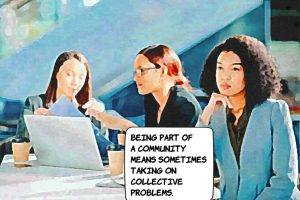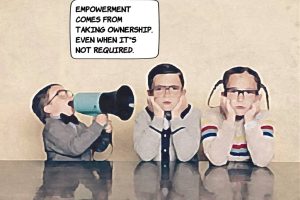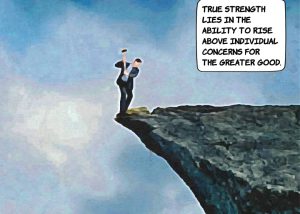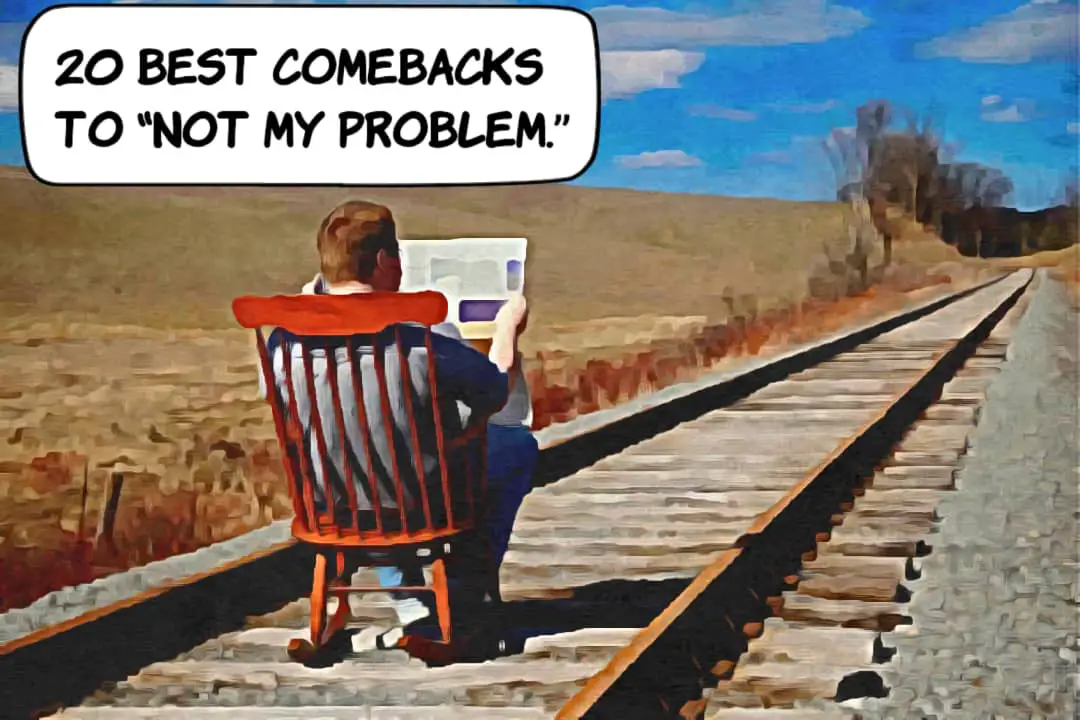People say this all the time, “not my problem”, and they often mean it. It is a common thing we say when we don’t want to have anything to do with an issue. It is also used to shut people up.
And we often don’t know what to say in return. If you have been in this situation and drew blanks on what to say, this article is for you.
Here are 20 smart comebacks for when someone says, “not my problem.”
Dig in.
20 best comebacks to “not my problem”
1. It might not be your problem, but it is someone’s. Empathy goes a long way.

This comeback encourages the person to consider the impact of doing nothing, on others and promoting empathy.
As you may have noticed, people would say “ not my problem” to avoid taking responsibility for something.
Or to avoid being what is supposed to be the solution to a larger problem.
- Maybe it’s not your problem, but think about how it affects those involved.
- Even if it’s not directly your issue, showing empathy can make a difference.
2. It could become your problem if ignored. Prevention is key.
This comeback highlights the importance of addressing potential issues early to avoid complications later.
Comebacks do not have to be harsh. They can encourage someone who doesn’t want to be a part of a problem to at least be a part of the solution.
Also the person needs to realize the nature of certain problems: they can become yours given time.
- Ignoring it now might make it your problem later on.
- Taking action early can prevent it from becoming your problem down the road.
3. Being part of a community means sometimes taking on collective problems.

This comeback here emphasizes the shared responsibility within a community or group. A person who says “not my problem” probably doesn’t like the idea of team work. The thought of community scares some.
Granted, having to deal with other people presents special challenges. This comeback suggests that we cant always avoid being part of something.
- In our community, we all pitch in to solve problems, even if they’re not directly ours.
- We’re all in this together; sometimes we have to tackle problems as a team.
4. Your perspective might change if roles were reversed. Think about it.
This one encourages the person to consider how they would feel if they were in a different position.
Using a comeback that helps a person shift their perspective is a great way to respond. People who often say “not my problem” have a problem with their perspective.
They think they could never find themselves in the situation they are now pushing off their shoulders. This comeback helps the person imagine how they would feel if the roles were reversed.
- Imagine if you were in their shoes; would you want someone to say the same to you?
- Consider how you’d feel if the situation were reversed; empathy works both ways.
5. Taking on challenges outside your scope builds resilience and skills.

The comeback highlights the opportunity for personal growth and development. The person who says “not my problem” may lack resilience and skills, the same qualities we all need for solving problems.
Also this person may be afraid to step out of their comfort zone. A comeback like this may be what he needs to hear to get into a social program.
- Stepping up to challenges, even if they’re not yours, can help you grow.
- Facing issues beyond your immediate responsibility can strengthen your problem-solving skills.
6. Every problem solved contributes to a better environment for everyone.
This comeback reinforces the idea of collective improvement through individual efforts. Say this comeback in a matter of fact tone. When someone says “not my problem” they show they care only about themselves.
With this comeback you help the person see beyond the problem, that they are simply a unit, a part of a whole.
You may ask first if the person is concerned about contributing to a thriving environment.
- Even if it’s not your problem, solving it benefits everyone.
- Contributing to solutions, regardless of ownership, enhances our collective well-being.
7. Ignoring problems perpetuates a cycle of complacency. Let’s break it.

This comeback encourages proactive engagement to address underlying issues. A person would say “not my problem” if they are the complacent type.
They have formed a pattern of ignoring problems. Their go-to defense is, “not my problem”. We have many of these people in our society. They contribute nothing to solutions but everything to perpetuating problems.
This is the type of comeback you say in words. With the right expression, this comeback will wake the person up to their social responsibility.
- Choosing to ignore problems only allows them to persist.
- Let’s be proactive and break the cycle of ignoring issues that need attention.
8. True leadership involves addressing issues, even when they’re not yours.
This one highlights the qualities of effective leadership and accountability. This comeback draws the attention of the person to the issue of leadership.
The person can either continue to be a follower or step up. To be an effective leader one must be ready to step up to life and accept challenges.
Instead of saying “not my problem”, and assuming other people would do it, this comeback wakes the person up to their social responsibility.
- Leadership means taking responsibility for collective challenges.
- Being a leader sometimes means stepping up, even when it’s not your direct concern.
9. We’re all interconnected. What affects one can eventually affect all, which includes you!
This comeback emphasizes the interconnectedness of individuals and communities. Hopefully the person who says “not my problem” would see that they are a member of the community.
As noted earlier in this list, certain folks are unable to see how their input into solutions is important.
They can’t believe they can become a victim of societal problems. They shut themselves in and hope someone else will deal with the issue.
- In our interconnected world, one problem can have ripple effects.
- Remember, we’re all connected; addressing issues benefits everyone.
10. Choosing to help isn’t a burden; it’s a demonstration of kindness and solidarity.

This one promotes the value of kindness and solidarity in addressing challenges. You don’t have to return the same energy as the person who says “not my problem”. The person likely feels helping out is a burden.
They don’t see helping others as an opportunity to be kind and show solidarity. This comeback, devoid of insult, is what they need to hear to set their mind at ease.
- Offering help isn’t a burden; it’s a gesture of solidarity.
- Kindness in action means lending a hand, even when it’s not obligatory.
11. Refusing to help closes doors to potential solutions. Keep them open.
This comeback encourages openness to finding solutions and collaboration, qualities the person likely lacks. Someone who says “not my problem” often agrees there is a problem to be solved, they don’t just agree they should be a part of the problem.
Everyone has potential. The person may just have what it takes to solve the problem but they will never. Except of course they hear this comeback.
- Being open to helping out can lead to unexpected solutions.
- Closed doors limit our ability to find creative solutions together.
12. The strength of a community lies in its members’ willingness to support each other.
This comeback seeks to reinforce the idea of community strength through mutual support. Someone who says “not my problem” is not necessarily avoiding getting caught up in something that doesn’t concern them. They may simply be arrogant.
Or they don’t believe in community. They don’t believe in supporting others. If only they can be shown that community is not complete until people come together.
- Our community thrives when we support each other, even in small ways.
- Supporting each other strengthens the bonds within our community.
13. Ignoring problems diminishes our collective potential. Let’s aim higher.

This comeback encourages aiming for collective progress and improvement, something many people don’t know about. If someone says, “not my problem”, they are probably trying to avoid adding their quota to the collective good of the society.
They do not understand the role they play in their immediate environment.
Some people just want to wish problems away. They hope that if they say “not my problem” then the problem will avoid them or magically be gone.
- Together, we can achieve more by addressing challenges head-on.
- Let’s raise the bar by confronting issues rather than ignoring them.
14. Even if it’s not your problem, your involvement can make a significant difference.
This one highlights the impact of individual actions in addressing challenges. With this comeback you agree with the person that it isn’t their problem.
But you let them know this does not mean they can not be involved in the process that brings solution.
The focus is on the significance of everyone’s effort in the community. You let the person know no matter how small their contribution, it is significant.
- Your input could be the key to solving the problem, even if it’s not yours initially.
- Your involvement can bring fresh perspectives and solutions to the table.
15. Empowerment comes from taking ownership, even when it’s not required.

This comeback promotes a sense of empowerment through proactive engagement. For the one who says “not my problem”, they are going to feel admonished by your tone if you say it right.
The focus of this comeback is helping the person appreciate that his involvement empowers him or her.
This empowerment is even more guaranteed when his involvement is not required but he gives it all the same.
- Taking ownership of challenges, regardless of ownership, empowers us all.
- Empower yourself by embracing opportunities to make a difference.
16. Seeing beyond immediate concerns builds a foundation for long-term growth.
This comeback emphasizes the importance of forward-thinking and strategic problem-solving.
And the one who says “not my problem” probably lacks these qualities. Depending on your tone, they will likely see this problem as an opportunity to learn these attributes.
Some among us are trapped in their immediate concerns, this is why they refuse to add on more responsibilities.
And there is nothing wrong with this in itself. This method just doesn’t contribute to the overall growth of the person.
- Looking ahead helps us build resilience for future challenges.
- Considering the big picture fosters sustainable solutions over time.
17. Small acts of kindness ripple into larger waves of positive change.

This comeback illustrates the transformative power of kindness and collective action.
It also reminds the person who says “not my problem” that what is required most times is small acts. It is the totality of small acts that brings about larger waves of positive changes.
Often when we are told about a difficulty, we are not being asked to take on the whole deal. Sometimes words of encouragement are all that is needed.
- Even small gestures can spark significant shifts in our community.
- Kindness has a ripple effect; your action matters more than you realize.
18. Challenges are opportunities in disguise. Embrace them.
This one encourages a positive mindset towards tackling challenges. The tone here is that of admonition.
This comeback can be said in harsher tones. It is your decision how to deliver this, especially if you’re trying to match the energy given by the person who says “not my problem”.
The most impactful part of this comeback is when you say, “Embrace it!”
- Embrace challenges as stepping stones toward greater success.
19. Being part of a solution is far more fulfilling than being indifferent.
This one highlights the satisfaction derived from active involvement in problem-solving.
Most who say “not my problem” are indifferent about the problem because they are personally not affected by it.
This comeback helps the person see it is okay not to be part of the problem, but how about being a part of the solution? Most people would want that.
- Contributing to solutions brings a sense of fulfillment and purpose.
- Actively participating in problem-solving enriches our lives and communities.
20. True strength lies in the ability to rise above individual concerns for the greater good.

This one emphasizes the importance of collective well-being over personal interests.
Some who say “not my problem” have a warped view of strength. They think avoiding responsibility for others is them asserting their power.
This comeback is straightforward enough to help them change this mindset.
- Our collective strength shines when we prioritize the greater good.
- Strength is found in unity; let’s work together for a brighter future.
Final Thoughts
Next time someone says “not my problem” use any of the comebacks here to get them to change their minds. Tone is everything when giving comebacks. Your facial expression is also a huge part of the deal.
Comebacks can be sarcastic in tone but we have made the ones here more positive since we want the other person to embrace positivity.

Leave a Reply